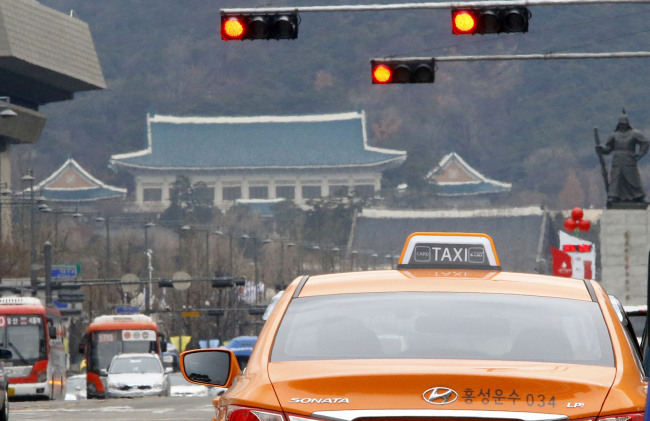
<관련 영문 기사>
Lee, parliament collide over taxi bill
By Song Sang-ho
The government and lawmakers are on a collision course after President Lee Myung-bak on Tuesday vetoed a parliament-approved bill on the taxi business, which he criticized as a populist legislation giving unfair subsidies to the industry.
Both ruling and opposition parties denounced the rejection as tax operators threatened to strike.
At the Cabinet meeting presided over by Prime Minister Kim Hwang-sik, ministers decided to call on the National Assembly to reconsider and vote again on the bill, and instead enact a new law to support the taxi industry.
The bill calls for categorizing taxis as public transportation eligible for state subsidies. Officials and critics said that it would restrict welfare, defense and other crucial national budgets.
“Public transportation refers to modes of mass transport that have regular routes and time schedules. Thus, taxis can’t be included into the category (of public transportation),” said Lim Jong-ryong, minister of the Prime Minister’s Office, during a press briefing.
“(The bill) does not serve the purpose of the public transportation law, which is designed to curtail social and economic costs stemming from traffic congestion, environmental contamination and energy consumption.”
Adding that there are no countries that recognize taxis as mass transportation means, Lim stressed the bill could raise issues of “fairness” given that passenger ships, airplanes and chartered school buses are not designated as public transportation.
The Assembly passed the bill on Jan. 1 with 222 of the total 300 lawmakers endorsing it. Neither the ruling nor opposition parties spoke out against its downsides due to a possible backlash from some 300,000 cab drivers ahead of the presidential poll.
The government estimated that taxpayers’ money amounting to some 1 trillion won ($940 million) would be required each year to implement the legislation entailing the same state benefits currently granted to buses, trains and subways.
Calling the presidential move a “breach of social consensus,” the nationwide association of taxi operators decided to launch regional strikes in Seoul, Busan and Gwangju later this month and next month. It held an emergency working-level meeting to discuss details of their strikes.
The taxi union dismissed the new law to support the taxi industry as “unrealistic.” They stressed that although similar legislations have been proposed many times in the past, none of them have been put into practice.
The envisioned law the government announced on Tuesday includes offering financial support and tax benefits, setting up a welfare fund for them, and imposing a cap on the number of new taxi drivers to regulate the oversaturation of the taxi market.
The government underscored that the proposed law will help support taxi drivers whereas the rejected bill is largely to benefit the companies.
“The new law is to set up a welfare fund and has a provision to prevent (companies) to demand that drivers pay for the partial cost of purchasing and washing their cars,” Land, Transport, and Maritime Affairs Vice Minister Joo Sung-ho told a press conference.
Both the ruling Saenuri Party and main opposition Democratic United Party are expected to take steps for a revote on the bill. Observers said that as more than two-thirds of the total lawmakers already approved of it in the initial vote, there might not be any critical hurdle for its passage.
Saenuri floor leader Rep. Lee Hahn-koo said that his party would first look into the government’s position and the newly proposed law. But he said that if the DUP pushed for the revote, the ruling party would accept it.
DUP floor leader Rep. Park Ki-choon called for an immediate revote over the bill.
“After candidate Park Geun-hye’s election victory, 222 lawmakers approved of the bill and virtually reached a social consensus on it. The presidential rejection breaks that consensus and only prompts conflict,” Park told reporters.
A parliamentary revote requires the approval from more than two-thirds of the lawmakers participating in the vote. More than half of the total 300 lawmakers should attend the revote. The president cannot reject the reapproved bill.
President-elect Park did not issue any comment on the politically sensitive issue. Her aides suggested the incumbent government draw up sufficient measures to support the taxi industry.
“It is not a matter we can meddle in. It is what the (current) government and the parliament should handle. I believe the current government should put forward solutions,” Park’s aide told media.
Since last year, the bill has been a political hot potato with critics arguing that it was an “extravagant, populist” scheme to win votes in the presidential election.
Taxi drivers, who have long complained that they are increasingly squeezed by low fares and high fuel prices, have long been lobbying for the bill’s passage. But bus firms fear that if the bill is signed into law, it would put bus operators, already struggling with mounting losses, in the position of having to compete with taxis for government support.
(sshluck@heraldcorp.com)





